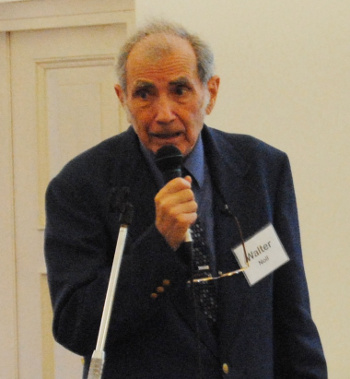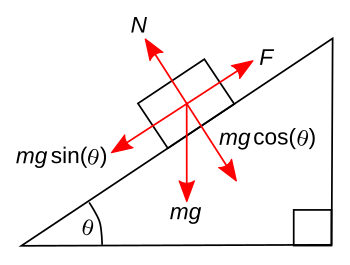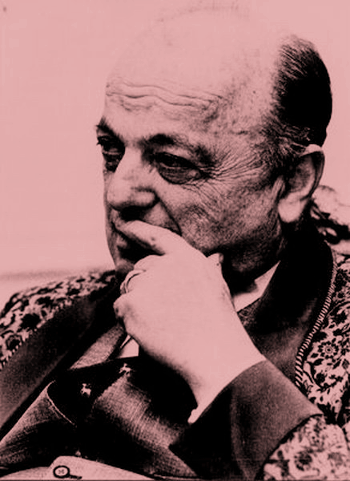Walter Noll (1925-2017)
July 6, 2017
Science teachers tend to simplify things for their
students, and this often includes an
historical summary of the topic area that shows the
logical steps to the science that we have today. Most of this is pure
hagiography, with the dead-end
theories and other missteps edited away. Often, the stated origin of a
scientific principle is at a convenient, modern
milepost. That's why I always enjoy probing the
ancient texts for clues to where
ideas might have originated.
Mathematician and
American Mathematical Society fellow,
Walter Noll (1925-2017), developed
mathematical tools in the
physics areas of
thermodynamics and
classical mechanics. He was, therefore, qualified to add his perspective to an article by
Frank Wilczek about the
law of motion,
F = ma,
equation published in the October, 2004, issue of
Physics Today.[1]

Mathematician, Walter Noll (1925-2017).
This photo was taken at the XXXII International Congress of The Italian Society of Historians of Physics and Astronomy, Physics, Astronomy and Engineering, Rome, Italy, September 27, 2012.
(Wikimedia Commons image by "Emanzamp.")
While I used the
F = ma equation often in my work, I still recall the many times that I was
forced to use it as a student (
pun intended). Its application was not
intuitive. This point was amplified by one of my
professors, who told us that
all physics (he meant classical mechanics) was
F = ma. Our problem was to decide what
F,
m, and
a meant under the specific conditions of our problem. This was not very encouraging for a young
physicist.
Noll had a similar
opinion of
F = ma, which is an equation that's applied to not only
dynamics, but to
statics. In statics, the
acceleration a is obviously zero, but it's explained-away by the idea that the
sum of the forces is zero. This is mathematically correct, but does this gloss over some important physics?[2]
Noll points out that this idea of balanced forces preceded
Newton's F = ma, and it originated with
Archimedes. As Noll summarizes,
"In non-classical physics, the term "force" is used when such things as gravitational force, electromagnetic force, weak force, and strong force are considered. The term cannot be given an interpretation similar to the one used in classical physics..."[2]

Flashback to college freshman physics.
Forces on a body on an inclined plane.
If the block is held by friction, there's no acceleration, so where's the force?
(Created using Inkscape.)
This was not the only time in his
career that Noll, who died at age 92 on June 6, 2017,[3] waxed
philosophical. Born in
Berlin,
Germany, on January 7, 1925, to Franz and Martha Noll, Noll had his early
education in a
suburb of Berlin, excelling in mathematics and physics.[3-4] His studies were interrupted by
World War II, when he was
drafted into the
German army in 1943.[3] Many of his
classmates were killed in the war, but Noll sustained a
non-combat injury and was in a
hospital for many months. Due to a fortunate
administrative error, he remained several months at
home before returning to the army.[3]
Noll studied mathematics after the war at the
Technical University of Berlin, also taking classes at the
Humboldt University of Berlin and the
Free University of Berlin.[3-4] He was a foreign student at the
University of Paris from 1949-1950, attaining the degree of
Licencié ès Sciences, then going on to get a
Diplom-Ingenieur (in Mathematics) at the Technical University of Berlin.[4] He remained at the Technical University as an
instructor in its
Institute for Engineering Mechanics for four years, taking leave in 1953 to obtain his
Ph.D. in
Applied Mathematics from
Indiana University (Bloomington, Indiana).[4]
Noll his Ph.D. at Indiana University in 1954 for a
thesis entitled, "On the Continuity of the Solid and Fluid States."
Clifford Truesdell was his
thesis advisor, and he was Truesdell's first doctoral student.[4] His thesis was published in the
Journal of Rational Mechanics and Analysis and also in one of Truesdell's books.[3] His thesis was completed in just a year, after which time Noll returned to Germany to
marry his first
wife, Helga.[3]

Clifford Truesdell (1919-2000).
Truesdell was also an historian of science and mathematics, editing, or co-editing, six volumes of the collected works of Leonhard Euler.
(Copyright Mathematisches Forschungsinstitut Oberwolfach, Creative Commons Licensed, via Wikimedia Commons. Modified for artistic effect.)
Noll's first position was at the
University of Southern California, where he stayed a year after
emigrating to the
United States in the fall of 1955, after which he joined the
faculty at
Carnegie Institute of Technology (now,
Carnegie-Mellon University) in 1956.[4] Although Noll remained at Carnegie Mellon from 1956 through the rest of his life, he undertook
visiting professorships at
Johns Hopkins University, the
University of Karlsruhe, the
Israel Institute of Technology, the
École Polytechnique in Nancy, the
University of Pisa, the
University of Pavia, and
Oxford University.[3-4]
Brian Seguin, one of Noll's doctoral students, now an
assistant professor at
Loyola University Chicago, said that Noll was most proud of his book, "Finite-Dimensional Spaces."[3] Noll is famous for the Coleman-Noll procedure that places restrictions on the kind of
materials that can occur in
nature in conformance with the
second law of thermodynamics (the
entropy law).[3]
Because of his post-war experiences with
hunger, Noll was a supporter of
CARE and similar organizations.[3] As most
professionals, he instilled in his
children the importance of
education. In a 2002 letter about mathematics education to the
Pittsburgh Post-Gazette, Noll wrote that "
memorization is deadly, while
conceptual understanding and problem-solving ability are essential."[3]
Noll survived his first wife, Helga, who died in 1976, and he married Mary Strauss-Noll, a
Penn State University English professor, three years later.[3] When Mary died in 1999, Noll found his third wife, Marilyn Smith Noll, online, and they married in 2000.[3] Even at his advanced age, he enjoyed travel,
snorkeling in the
Great Barrier Reef at age 85.[3]
Noll retired from Carnegie Mellon in 1993, but he still taught, wrote and lectured.[3] He was a founding member of the
Society for Natural Philosophy, and a
fellow of the
American Mathematical Society.[3] As his
health was failing, he told his wife that he was still always thinking about mathematics.[3] Fortunately, there's a trove of his articles on the
Internet, a consequence of his distaste for
gate-keepers.[5]
Noll wrote several short articles that are more philosophical than mathematical, a few of which are listed below.
• The Future of Scientific Publication[5] - In this 2008 publication, Noll proposes that every scientist have his own website on which to publish his papers. This process would start with publication of his Ph.D. thesis, and it would enable a better dissemination of research than traditional journals. Noll recalls his suspicion that publication of one of his works was blocked at a particular publisher by a competing mathematician. He further remarks that his book, when published, was priced at $350, but he published it on his website at no charge.
• The Role of the Professor[6] - In this 1997 article, Noll states that the primary objective of a professor should be neither teaching nor research. Instead, he should "profess;" that is, spend most of his time telling the world how wonderful his subject area is. Noll writes that high school mathematics education is in a sad state because too few of its teachers have such passion.
• On the Past and Future of Natural Philosophy[7] - In this 2005 article, Noll writes how mathematics and physics were combined in the 17th and 18th century, but now they are separate specialties.
• What is Mathematics all about[8] - In this 2006 paper, Noll writes that memorization should be only a minor part of mathematics education. Presciently, he observes, "If all you can do is to solve a problem according to some recipe, you will soon lose your job, because you can be replaced by a computer program."
• Mathematics should not be boring[9] - The main point of this 2003 paper is that arithmetic and "being good with numbers" is different from mathematics.
References:
- Frank Wilczek, "Whence the Force of F = ma? I: Culture Shock," Physics Today, vol. 57, no. 10 (October, 2004), p. 11, doi: http://dx.doi.org/10.1063/1.1825251. Also here.
- Walter Noll, "On the concept of force," April, 2007, CMU Mathematics Department Web Site.
- Emily McConville, "Obituary: Walter Noll / Carnegie Mellon University mathematician," Pittsburgh Post-Gazette, June 11, 2017.
- Curriculum vitae of Walter Noll (MS Word Document), CMU Mathematics Department Web Site.
- Noll, Walter, "The Future of Scientific Publication," 2008, 6 pages, CMU Mathematics Department Web Site.
- Walter Noll, "The Role of the Professor, August, 1992 (revised April, 1997), 3 pages, CMU Mathematics Department Web Site.
- Walter Noll, "On the Past and Future of Natural Philosophy," 2005, 13 pages, CMU Mathematics Department Web Site.
- Walter Noll, "What is Mathematics all about," 2006, 9 pages, CMU Mathematics Department Web Site.
- Walter Noll, "Mathematics should not be boring," 2003, 18 pages, CMU Mathematics Department Web Site.
- Walter Noll, Collected Works, CMU Mathematics Department Web Site.
Permanent Link to this article
Linked Keywords: Science; teacher; student; history; historical; logic; logical; hagiography; theory; scientific principle; milestone; milepost; manuscript; ancient text; idea; mathematician; American Mathematical Society; fellow; Walter Noll (1925-2017); physics; thermodynamics; classical mechanics; Frank Wilczek; Newton's laws of motion; equation; scientific literature; publish; Physics Today; XXXII International Congress of The Italian Society of Historians of Physics and Astronomy, Physics, Astronomy and Engineering; Rome, Italy; Wikimedia Commons; pun; intuition; professor; force; mass; acceleration; physicist; opinion; dynamics; statics; vector sum; Newton; Archimedes; Newton's law of universal gravitation; gravitational force; electromagnetism; electromagnetic force; weak interaction; weak force; strong interaction; strong force; flashback; college freshman; inclined plane; friction; Inkscape; career; philosophy; philosophical; Berlin; Germany; education; suburb; World War II; conscription; draft; German Army (Wehrmacht); classmate; non-combat; injury; hospital; military administration; error; home; Technical University of Berlin; Humboldt University of Berlin; Free University of Berlin; University of Paris; Licencié ès Sciences; Diplom-Ingenieur (in Mathematics); instructor; Institute for Engineering Mechanics; Doctor of Philosophy; Ph.D.; Applied Mathematics; Indiana University (Bloomington, Indiana); thesis; Clifford Truesdell; doctoral advisor; thesis advisor; Journal of Rational Mechanics and Analysis; marriage; marry; wife; historian; editor; Leonhard Euler; Mathematisches Forschungsinstitut Oberwolfach; Creative Commons License; University of Southern California; emigration; emigrated; United States; faculty; Carnegie Institute of Technology; Carnegie-Mellon University; visiting scholar; visiting professor; Johns Hopkins University; University of Karlsruhe; Israel Institute of Technology; École Polytechnique in Nancy; University of Pisa; University of Pavia; University of Oxford; Oxford University; Brian Seguin; assistant professor; Loyola University Chicago; material; nature; second law of thermodynamics; entropy; hunger; CARE (relief agency); professional; child; children; education; Pittsburgh Post-Gazette; memorization; conceptual model; conceptual understanding; Penn State University; English literature; snorkeling; Great Barrier Reef; Society for Natural Philosophy; health; Internet; gate-keeper; The Future of Scientific Publication; website; research; academic journal; publisher; competition; competing; The Role of the Professor; high school; On the Past and Future of Natural Philosophy; 17th century; 18th century">18th century; What is Mathematics all about; algorithm; recipe; employment; job; computer program; Mathematics should not be boring; arithmetic; real number.